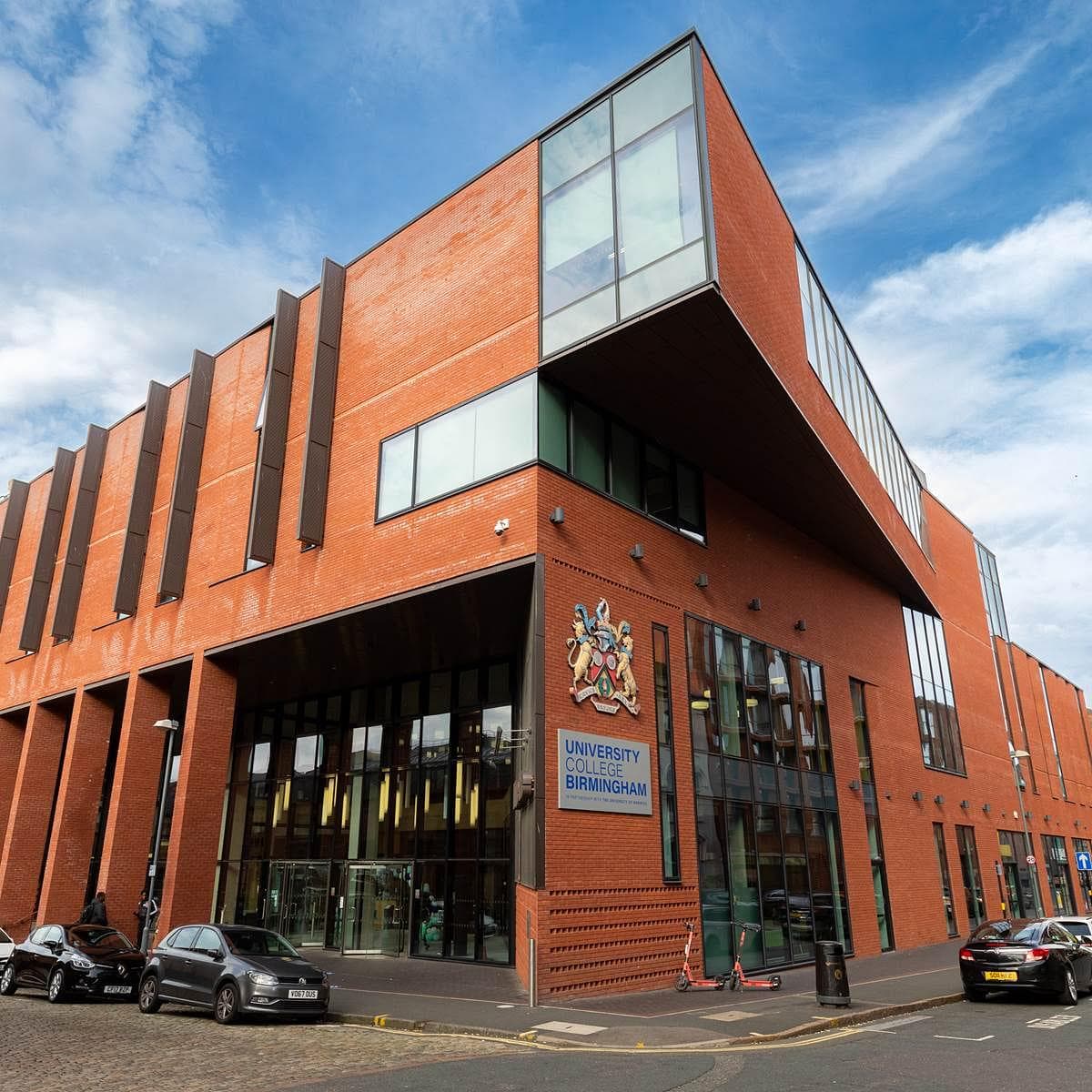

University College Birmingham
Birmingham, United Kingdom
- Cost of Living£ 16,248
- Tuition Fee From£ 10,500
- Country Rank-
- Batch Strength4,435
- Global Diversity40%
- Gender Ratio33:67
Overview
About
University College Birmingham (UCB) is a highly reputable higher education institution located in the heart of Birmingham, UK. Established in 1843, UCB has a long and rich history of providing quality education and training to students from around the world. The college was founded as a portion of Birmingham Municipal Technical School in the 19th century and associated studies under the control of Birmingham City. Today it is a full-fledged university with international students from more than 60 countries. With a strong focus on vocational education, UCB offers a range of undergraduate and postgraduate programmes in subjects such as hospitality, tourism, culinary arts, and fashion.
The college has a strong commitment to student support and well-being and offers a range of services and support to help students adjust to college life and achieve their full potential. These services include academic support, career advice, mental health and well-being support, and accommodation services. UCB has a reputation for excellence and has been consistently ranked as one of the top colleges in the UK. The college has strong links with industry and businesses, and this has led to a high level of employment success for its graduates. Many of the college's alumni have gone on to hold senior positions in some of the world's leading companies, and the college is proud of its reputation for producing highly skilled and employable graduates.
University College Birmingham has also received affiliation from authorized institutions. The list includes -
- SACS
- Great Cities’ Universities
- Sea-grant
- Space-grant
Ranking
University College Birmingham (UCB) is a well-respected institution in the UK. The University College Birmingham rankings can be seen in several national and international league tables. The Institution of Warwick, which is a distinguished Russell Group university has validated and awarded a wide range of undergraduate and postgraduate degree programmes in addition to several higher-level apprenticeships. Below are a few highlights of the university rankings -
- #84 - QS World University Rankings 2024
- #5 - University Guru 2024
Year
QS Ranks
US News Ranks
2025
#80
-
2023
-
-
2022
-
-
2021
-
#91
Facilities
The institution is also known for providing an excellent student experience. Along with a focus on practical learning, providing strong industry links, and a supportive campus community, the facilities offered by the university make UCB an excellent choice for anyone looking to pursue a higher education degree in the United Kingdom. The University College Birmingham facilities include academic provisions, services related to sports and fitness, accommodation facilities and also facilities for relaxation and socialization. Below is a list of the most used facilities at the university.
Teaching Kitchens -
UCB's teaching kitchens provide students with the opportunity to put their theoretical knowledge of culinary arts into practice. These modern kitchens are equipped with the latest technology and equipment, allowing students to learn in a professional environment.
Design Studios -
UCB’s design studios provide students with the space and resources they need to develop their creative skills in areas such as fashion, interior design, and graphic design. These studios are equipped with cutting-edge technology and equipment, including 3D printers, laser cutters, and digital cameras.
Hospitality Labs -
The hospitality labs at the institution provide students with a realistic and immersive learning environment for the hospitality and tourism industry. These labs are equipped with the latest technology and equipment, including hotel software systems and electronic point of sale (EPoS) systems.
Library -
The university library is a central resource for students, providing them with access to a range of academic resources, including books, journals, and digital media. The library is also equipped with study spaces and computers, allowing students to work independently or in groups.
Student Union -
The student union provides students with a range of social and recreational activities, including clubs and societies, events, and trips. This is an important part of the UCB experience and helps to create a vibrant and supportive campus community.
Sports Facilities -
UCB's sports facilities provide students with the opportunity to stay active and healthy. These facilities include a gym, sports halls, and outdoor playing fields.
Student Accommodation -
The university also provides a range of student accommodation options, including shared apartments and private rooms, to ensure that students have a comfortable and convenient place to live during their studies.
Notable Alumni



Courses
Admission
University College Birmingham (UCB) is located in the heart of Birmingham, England. It was awarded full university status in 2012 and is known for its specialisation in hospitality, culinary arts, tourism, business, and education. University College Birmingham offers a straightforward admissions process for UK and international students, emphasising accessibility and support. A student can understand the complete University College Birmingham admissions with the help of the following read.
Things To Consider Before Applying
Students must be well aware of the complete admission requirements for the chosen course with the help of the information provided. Here are the critical admission requirements for international students from India applying to University College Birmingham:
Undergraduate Admission Requirements
- If you have completed the Indian Standard XII, you will be considered for entry to the first year of an undergraduate degree programme at UCB.
- For CBSE and ICSE boards, you need a minimum of 60% in Standard XII English (English Core/English Elective/Functional English) to meet the English language requirement. No additional SELT qualification is required.
- For other Indian state boards, you need a minimum of 65% in Standard XII English to meet the English language requirement.
Postgraduate Admission Requirements
- If you have completed a 3 or 4-year Bachelor's degree from a recognised university in India, you will be considered for postgraduate study at UCB.
- For a Master's programme (MA/MSc), you typically need a minimum of 60% (2:1 equivalency) in your Bachelor's degree.
- For a Postgraduate Diploma (PGDip), you typically need a minimum of 50% (2:2 equivalency) in your Bachelor's degree.
English Language Requirements
University College Birmingham has specific English language requirements for international students, including those from India, to ensure they are adequately prepared for their studies. Here are the details:
For Undergraduate Courses
Students must demonstrate proficiency in English through accepted qualifications to meet the University College Birmingham eligibility. For students from India, the following are generally accepted:
- CBSE/ICSE Boards: A minimum of 60% in English in the Standard XII examination.
- Other State Boards: A minimum of 65% in English in the Standard XII examination.
For Postgraduate Courses
Applicants typically need to show at least 60% in their undergraduate degree but must also demonstrate specific English language proficiency.
This can be through:
- A recognised English language test such as IELTS, TOEFL, or PTE.
- A minimum IELTS score of 6.0 overall, with no less than 5.5 in any band, is commonly required, though some programmes may have higher requirements.
Alternative Qualifications: If students do not meet the above requirements, UCB offers pre-sessional English courses to help improve language skills before starting their degree programmes.
Validity of Qualifications: English language qualifications must typically be obtained within the last two years to be considered valid.
UCB emphasises the importance of English proficiency to ensure students can fully engage with their academic programmes and succeed in their studies.
How To Apply To University College Birmingham?
Prospective students can follow a structured process to apply to University College Birmingham, depending on whether they are applying for undergraduate or postgraduate courses. Below is a detailed breakdown of the application process.
Application Process for Undergraduate Students
- Choose Your Course: Explore the range of undergraduate courses offered by UCB. Make sure to review the University College Birmingham entry requirements for each programme.
- Application Methods: If you are only applying to UCB, you can use the direct application method, which is free of charge and does not require a personal statement. UCB will submit your application to UCAS on your behalf.
- UCAS Application: If you wish to apply to multiple universities, you must apply through UCAS. This involves a fee (£27.50 for up to five choices for entry) and requires a personal statement.
- Complete the Application: Complete the online application form available on UCB's website for direct applications. Visit the UCAS website to register and complete the necessary information for UCAS applications.
- Submit Required Documents: Prepare and submit any required supporting documents, such as academic transcripts, proof of English language proficiency, and references.
- Application Review: Once your application is submitted, UCB’s Admissions Team will review it. You will receive email notifications regarding the status of your application.
- Interviews and Offers: Some courses may require an interview during selection. Offers may be conditional or unconditional based on your qualifications.
- After Acceptance: If you receive an offer, you must confirm your acceptance and prepare for enrollment, including attending orientation sessions.
Students can connect with UniScholars experts to make their application foolproof. Connect today!
Application Process for International Students
- Choose Your Course: Like domestic students, international applicants should review the courses available and their specific entry requirements.
- Application Methods: International students can apply directly via the online application form. This method is encouraged for those applying only to UCB.
- UCAS Application: International students can also apply through UCAS to apply to multiple universities.
- Complete the Application: Register on UCB's application portal and complete the online form, selecting your desired course level.
- Submit Required Documents: Include academic transcripts, proof of English language proficiency (e.g., IELTS scores), and other relevant University College Birmingham documents.
- Application Review: UCB aims to respond to international applications within five working days.
- Visa and Immigration: Once accepted, international students must apply for a student visa to study in the UK.
- Orientation: Attend the orientation programme to familiarise yourself with UCB and available support services.
UCB provides various support services, including workshops for applicants unfamiliar with the UCAS process, one-on-one consultations, and dedicated international admissions teams to assist throughout the application process.
Deadlines
The UCAS application deadline for undergraduate courses is January 31, ensuring equal consideration for most courses starting in September. However, the Medicine and Dentistry programme deadline is earlier, on October 16. UCB continues to accept late applications, particularly from non-UK/EU applicants, until August, with a confirmation deadline of June 30. Postgraduate courses have more flexible application timings, with international applicants advised to apply two to three months before the enrollment deadline and specific University College Birmingham deadlines depending on the applicant's location.
UCB aims to notify undergraduate applicants of their decisions by May 16 if applications are submitted by the January 31 deadline. Postgraduate applicants can expect a decision within 6 to 8 weeks after submission. UCB encourages early applications, as some courses may close to late applicants, and offers support workshops to guide applicants through the UCAS process.
|
Category |
Application Deadline |
Decision Date |
|
Undergraduate Courses |
UCAS Application Deadline |
May 16 (or earlier) |
|
January 31 (most courses) |
||
|
October 16 (Medicine and Dentistry) |
||
|
Late Applications |
||
|
Accepted until August (non-UK/EU applicants) |
||
|
Confirmation Deadline |
||
|
June 30 (for January applications) |
||
|
Postgraduate Courses |
International Applicants |
6 to 8 weeks after submission |
|
2-3 months before enrollment (recommended) |
||
|
31 days before enrollment (non-EU applicants outside the UK) |
||
|
10 working days before enrollment (Home and EU applicants) |
University College Birmingham Selection Criteria
University College Birmingham uses a comprehensive selection process to evaluate prospective students. The university considers various factors to ensure candidates are well-suited for their chosen programmes. Here are the key selection criteria:
- Academic Qualifications: UCB places significant emphasis on academic achievements. A-levels, BTECs, or equivalent qualifications are typically required for undergraduate courses. A relevant bachelor's degree is essential for postgraduate courses. UCB also considers applicants with non-traditional qualifications on a case-by-case basis.
- Personal Statement: The personal statement is a critical component of the application process. It allows applicants to demonstrate their passion for the chosen subject, explain their motivations for applying, and highlight relevant experiences and achievements.
- References: Academic or professional references are essential in the selection process. These should provide insight into the applicant's abilities, character, and suitability for the course.
- Work Experience: Relevant work experience can strengthen an application for certain courses, particularly those in health, social care, and business. UCB values practical experience, which demonstrates an applicant’s commitment and understanding of the field.
- Interviews and Auditions: Some programmes, especially in areas like health and performing arts, may require an interview or audition. This allows applicants to showcase their skills, knowledge, and suitability for the course in a more interactive setting.
- English Language Proficiency: For international students, proficiency in English is crucial. UCB requires proof of English language skills through recognised tests such as IELTS or equivalent unless the applicant's previous education was conducted in English.
- Portfolio (for specific courses): Applicants to creative courses, such as design or culinary arts, may be required to submit a portfolio of their work. This portfolio should showcase their creativity, technical skills, and passion.
- Extracurricular Activities: Involvement in extracurricular activities can also enhance an application. UCB values well-rounded candidates who demonstrate leadership, teamwork, and a commitment to their interests outside the classroom.
By assessing these criteria, UCB ensures that they select students who are not only academically capable but also passionate and prepared for the challenges of their chosen fields.
University College Birmingham Acceptance Rate
University College Birmingham acceptance rate is approximately 78%. This figure indicates that UCB is relatively accessible compared to many other universities, although acceptance rates can vary by specific programmes and courses. Some courses may have more competitive admission criteria, affecting the overall acceptance rate for those particular fields. This acceptance rate reflects the university's commitment to providing opportunities for a diverse range of students, making it a viable option for many applicants.
Fees
University College Birmingham fee differs for international students in both undergraduate and postgraduate programmes. Here’s a detailed breakdown of the fees:
|
Programme |
Past Fee |
Upcoming Fee (Approx.) |
|
Undergraduate Programmes |
||
|
Standard Undergraduate Fee |
£13,500 per year |
£14,000 per year |
|
Accelerated BA (Hons) |
£15,000 per year |
£15,500 per year |
|
Online BA (Hons) |
£5,800 per year |
£6,000 per year |
|
Postgraduate Programmes |
||
|
Standard Postgraduate Fee |
£14,500 per year |
£15,000 per year |
|
Integrated Pre-master's Programme |
£22,000 per year |
£22,000 per year |
|
Additional Programmes |
||
|
International Foundation Diploma |
£9,500 per year |
£10,000 per year |
|
Pre-sessional English Course (6 weeks) |
£1,980 |
£1,980 |
|
Pre-sessional English Course (10 weeks) |
£3,300 |
£3,300 |
|
Placement Fees |
||
|
Full-Year Placement |
£500 |
£500 |
|
Half-Year Placement |
£250 |
£250 |
The tuition fees set for international students for their first year will remain the same for all subsequent years, meaning there will be no fee increases for the course duration. Students should also budget for living costs, accommodation, and other expenses not included in the tuition fees.
Scholarship
Here are some of the scholarships available for students at University College Birmingham:
|
Name Of The Scholarship |
Eligibility |
Grant |
|
International Scholarship Award |
For the first year students (limited availability)
|
£1,000 discount on tuition fees |
|
Digital Award |
Available to selected groups of students (pilot programme)
|
Variable amount |
|
High Achievers Scholarship |
Full tuition fee waiver for the first year |
70% – 74% average: £3,000 75% – 80% average: £5,000 |
Finances
Most international students are obligated to show proof of sufficient funds in order to obtain a visa. While some students may have the opportunity to make use of scholarships, not all students cut the eligibility to get a scholarship or a grant. Moreover, not all scholarships cover 100% of your study abroad expenses. At such times, most students resort to acquiring education loans to avoid the financial hassles associated with studying at the university. For Indian students, UniCreds is the ideal education loan marketplace if you’re looking for low-interest rates and free consultation services!
Cost Of Studying At University College Birmingham
Interest rates as low as 8.9% *
Avg. on-campus living expense £16,248
250K+
Students Assisted
800Cr+
Loan Amount Disbursed
5000+
Loans Sanctioned
Accommodation
There are several student accommodations in Birmingham that are fully equipped for your needs. Student accommodation near University College Birmingham offers a wide choice of affordable yet elegant student flats, halls of residence, studios, ensuites, and more! You have the option of staying on campus in the university halls of residence or a private residence. Because of their proximity to the university, on-campus housing options may be ideal; nevertheless, they tend to fill up fast and are more expensive.
UniAcco simplifies the process of finding student housing and offers a variety of options. As a result, students can select from an array of available student accommodations near the university, such as luxury studios, en-suites, and shared apartments that are inexpensive and fully furnished with 24/7 staff support.
Cost of Living
Birmingham is a bustling city in the West Midlands region of England, and it is home to several prestigious universities, including the University College Birmingham. As a result, the city has a vibrant student population and a thriving student culture. For students, Birmingham offers a diverse range of activities and experiences, both on and off campus. The city is as vibrant as London and other major cities, but what makes it preferable is that the cost of living in Birmingham is much cheaper. Below is a list of expenses for prospective students at the University College Birmingham -
|
Particulars |
Cost (Monthly) |
|
Off-Campus Accommodation |
£680 |
|
On-Campus Accommodation |
£608 |
|
Transportation |
£60 |
|
Food Cost |
£390 |
|
Entertainment |
£42 |
|
Groceries |
£112 |
|
Clothes |
£70 |
|
Total Cost of Living with Off Campus Accommodation |
£1,354 |
|
Total Cost of Living with On Campus Accommodation |
£1,282 |
|
Annual Cost of Living |
£16,248 |